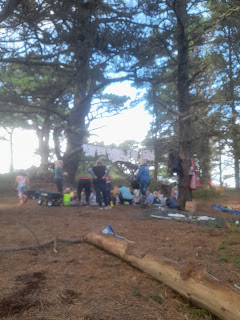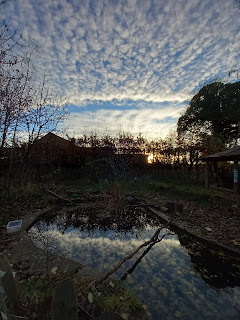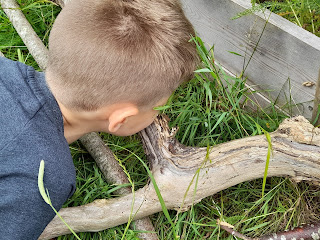The End of Summer (Part 1)
This year Summer has been varied weather-wise, the UK has had 4 seasons in 3 months with mini heatwaves, frost, storms, rain, and hosepipe bans!
The Scilly Isles were no exception, and the fortnight that covered Forest School managed sunburn and horizontal rain! However the islands remain beautiful, and the children continue to enjoy a childhood that most no longer have the chance to!
The islands are small, only 2300 inhabitants, which must triple when tourists arrive! About 200,000 people visit each year,and the vast majority of those will choose the summer months. However, thus small community means everybody knows everybody else. Children are definitely raised by 'the village', and while nowhere is 100% safe, the Isles are as safe as you are likely to get.
Children are pretty much free range. The Scilly Isle is made upmof 140 'island' at low tide, some are home to wildlife, some are large rock formations, five are inhabited islands, with a few more housing a few isolated dwellings. The children who grow up here do get to know all the islands, but whichever they live on, they can explore beaches and woodland, wander over to friends homes, and get to enjoy nature as much as they choose.
Throw in dodgy WiFi and mobile coverage and the lure of being online is slightly diminished!
At Forest School the children arrive with a distinct plan of what they want to do. It may alter and grow, but often in a session children can look a little lost, used to their time being directed, unsure of how to entertain themselves...
That doesn't happen on the Scillys!
For a start it's unlikely that basecamp will be in a setting the children do not know. Even with parents in tow, children quickly get to know almost every corner of their own island, and eventually other islands too.
The sea obviously dominates life here. From owning a yacht, to needing boats to travel to and fro each island, to the ferry which takes people to and from the mainland (and bringing in goods and grocery stocks), to Quay jumping fun, paddleboarding, snorkeling, and beachcombers. Beaches are playgrounds, and woodland is small enough to become wholly familiar. It will take less than half a day to walk around the entirety of the largest island so the experience of being in a 'forest' isn't exactly rare.
There isn't always an opportunity for children to meet as a group. There is school, there are clubs, but over the summer holidays I know Chartham children will have caught up with many friends, and that the new eyfs classes will meet up en masse to get to know each other, approximately 60 children. On the islands there are less than 300 children in both Primary and Secondary school!
The children who come to Forest School love the opportunity to see friends and classmates. They also enjoy being accompanied by visiting family and meeting tourist children - new friends.
They are comfortable in their environment. They can name most of the trees, have a great sense of direction, and are open to try new things, as well as having no issues with mud or getting wet!
Forest School is not their only link with nature and the outdoors, so although they appreciate the venue, it isn't quite so fascinating! Activities are another matter. The children are used to walking, running, biking, and even swimming with friends. But an array of experiences to explore is something they don't see in the woods very often!
The excitement at soft toys, magnifiers, trollies, and crafts, as well as hammocks and rope swings, was a joy to behold. These are not things often found amongst the trees so the extension they gave to the role play games created meant their games lasted longer and took sudden twists in plot!
Children used to an immersion in outdoor life still find ways to create and discover and learn from a Forest School Setting.
Being able to provide and support something that allows them with their exploration and development of ideas is why I love Forest School.









Comments
Post a Comment